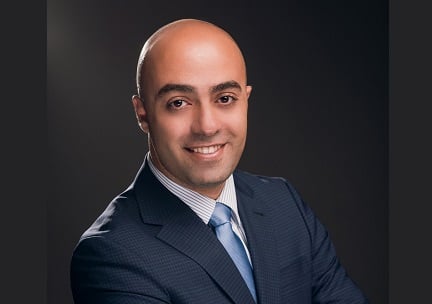Thierry Jabbour speaks to WP about what he finds to be the most fulfilling part of being an advisor

If one were to tally all the industries that required critical thinking and a strong capacity for numbers, the financial industry would be right up there. With the wide variety of instruments and asset classes, not to mention the different markets to invest in, the field is always challenging and ripe for exploration. And that’s exactly what attracted Thierry Jabbour to it.
“I have always had a great interest in the financial markets,” said Jabbour, who is a senior investment advisor at Manulife Securities. “My mathematical and deep analytical skills, together with the ability to analyze numbers and connect the dots in a complex financial setting, all contributed to making this industry appealing to me. This is a constantly evolving field.”
The world of finance is enormous, and it can be quite challenging for most people to navigate, but Jabbour has dedicated himself to mapping it. He is constantly on the lookout for opportunities to make money in the markets, outperform benchmarks, and create air-tight financial plans. He doesn’t do it just for the sake of it, but because he’s looking for a payoff — not for himself, but for his clients.
“Bringing peace of mind to my clients through tailor-made financial plans and sound investment advice, and making sure their portfolios are performing the way they should relative to their respective benchmarks, is most fulfilling aspect of my daily life,” he said.
He added that receiving a sincere thank you, or having an existing client refer him to others, are the best signs of appreciation he could receive. “It motivates me to reciprocate tenfold.”
The success he has enjoyed professionally comes from a passion to create value for his clients. “Sincerely caring about my clients’ well-being and trying my best to bring substantial value is a key success factor for me,” he said. “When you truly care, you never count the number of hours, nights and weekends you spend working on clients’ files and portfolios.”
Aside from hard work, Jabbour provides value to his clients because of his ability to listen, break down complex situations, and find opportunities. This is a skill and an art; to be able to take different inputs, separate the signals from the noise, and construct a cohesive map for his clients to follow. “Working together with recognized professionals, I have been providing a holistic view of my clients’ financial situations,” he said.
To reassure his clients that everything’s on track to achieve their desired financial, retirement, and estate goals, Jabbour believes that the tailor-made financial plans he creates should be updated regularly. The team needs to keep checking the map, ensuring it matches the terrain the clients are navigating. Every member of the team contributes toward that. “I have a well-structured team in place and continue to add more trained professionals, thus ensuring that every client has access to the best service possible.”
Of course, even the most solid plan and the most talented teams can be undermined by the client’s own behaviour. The OSC has released a primer on investor behavioural insights that could impact markets and investors, and even Morningstar is starting to appreciate the importance of behavioural finance. Jabbour is concerned about one thing in particular: the tendency to go off-course from long-term plans because of short-term risk-taking.
“Clients tend to choose their risk tolerance based on what they feel their risk threshold is,” he said. “However, helping a client define how much risk he or she can afford given his or her assets, projected expenses, and goals will assist in ensuring a comfortable retirement.”
To help clients gain a better understanding of their risk tolerance, Jabbour’s firm uses planning tools that show the impact of missing one’s targets. By forecasting the potential effects of such deviations, they give their clients a better chance to decide whether they’re comfortable with the possible downsides of short-term decisions.
Not all advisors have the same talents, skills, and resources to draw from. Some are good at understanding their clients’ objectives and coaching them to make the right decisions to achieve those goals. Others are more numbers-oriented, leading clients based on hard numbers and rigorous analysis. But for every advisor in the world of financial planning, Jabbour has just a few basic principles to share.
“Give your clients 110%, and keep educating yourself on ways to bring more and more value,” he said. “Whenever necessary, hire or refer your clients to the right professionals – tax lawyers, accountants, and estate planners, to name a few. Be present with them at meetings to explore all their options, to better understand their needs, and to make sure no stone is left unturned.”
Related stories:
Advisor: How my concept of money has changed
Advisor: How I turned my back on the corporate ladder



